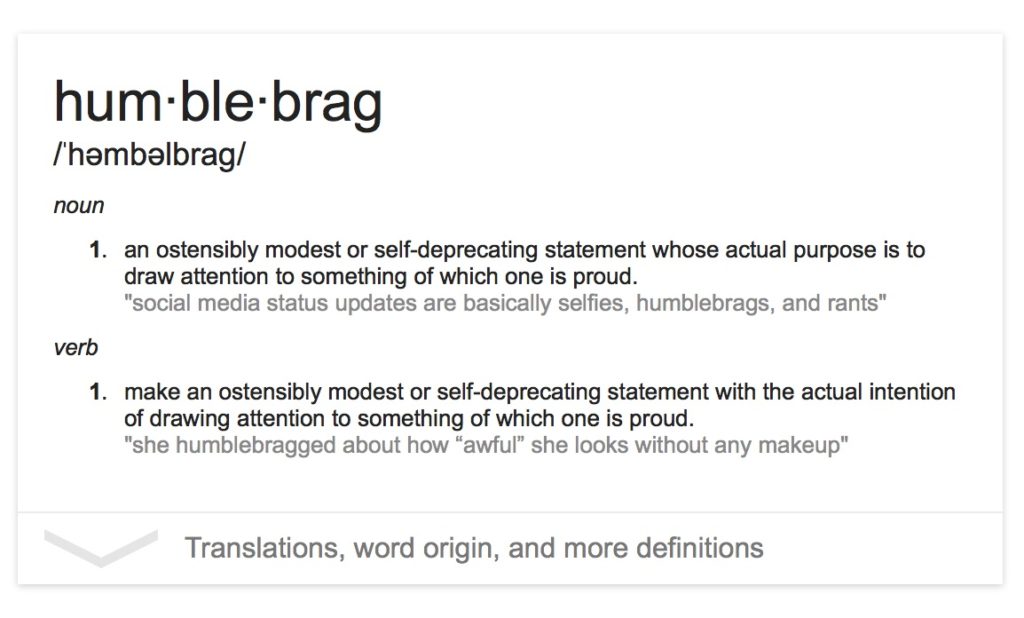Category: Uncategorized
Sukkot: Project-Based LIVING
We are deep into the holidays!
We have come out of Rosh Hashanah & Yom Kippur and headed straight into Sukkot. I have just finished my frame and look forward to this Sunday and when we will finish the decorations and usher in the holiday as a family.
 This is absolutely my favorite holiday of the entire year. There is nothing else like it on the Jewish Calendar – sitting outside in a sukkah you built yourself (which is pretty much the one and only thing I actually can and do build), with handmade decorations from your children, enjoying good food with friends and family in the night air, the citrusy smell of etrog lingering and mixing with verdant lulav – this is project-based Judaism at its finest.
This is absolutely my favorite holiday of the entire year. There is nothing else like it on the Jewish Calendar – sitting outside in a sukkah you built yourself (which is pretty much the one and only thing I actually can and do build), with handmade decorations from your children, enjoying good food with friends and family in the night air, the citrusy smell of etrog lingering and mixing with verdant lulav – this is project-based Judaism at its finest.
But here is a complicated truth: Even though our Jewish day schools will be closed on Monday and Tuesday for Sukkot, it is reasonable to assume that a sizable number of our Jewish day school students will not be found in neither synagogue nor sukkot enjoying what is known as “The Season of our Rejoicing”. But I’d wager that many, if not most, were in synagogue this week for Yom Kippur.
So when it comes to “atoning” we have a full house, but for “rejoicing” we have empty seats?
If our children – if we – only experience the Judaism of Rosh Hashanah and Yom Kippur and not the Judaism of Sukkot, the simple truth is that we are not exposing them to the full range of beauty and joy our tradition has to offer.
So why, in fact, is this what typically happens?
I’m not entirely sure, but I think it has to do with the exotic nature of the holiday. As  someone who did not grow up celebrating this holiday, upon coming to synagogue as an adult and watching a congregation march in circles waving fruits and branches – well this was not the Judaism I knew!
someone who did not grow up celebrating this holiday, upon coming to synagogue as an adult and watching a congregation march in circles waving fruits and branches – well this was not the Judaism I knew!
No one likes to feel uncomfortable and adults especially are wary of feeling uneducated or unprepared. I know how I felt encountering Jewish ritual for the first time as an adult – it was scary. I, however, was lucky. I was pursuing a degree in Jewish education and, therefore, had all the support and resources I needed to learn and grow. I realize that most adults coming at Jewish practice for the first time (or the first time in a while) are not so lucky. The amount of “stuff” Judaism asks of us to do – building the sukkah with precise specifications, shaking the lulav and etrog in the proscribed way, chanting less-familiar prayers, coming to synagogue on unfamiliar days – can be overwhelming.
But that’s also why it can be project-based Jewish living at its finest!
Don’t lose the forest through the trees…I’d simply ask you to consider this: When building your child’s library of Jewish memories, which memory feels more compelling and likely to resonate over time – sitting in starched clothes in sanctuary seats or relaxing with friends and family in an outdoor sukkah built with love and care?
You don’t have to choose just one, of course, that is the beauty of crafting a project-based life of sacred time. Come to synagogue for the High Holidays, to be sure. But don’t miss out on Sukkot (or Simchat Torah or Shavuot or “Add Jewish Holiday Here”). You can’t build a palace of time with only two beams (however “High” and “Holy” they may be)…
Let this Sukkot be your and your family’s experiment with project-based living. Build a sukkah or visit one. March with lulav and etrog. Eat outside. Experience the fragility of God’s world. Be glad. Make a memory.
Let this Sukkot truly be the season of our great rejoicing.
Chag sameach.
Remembering My Dad
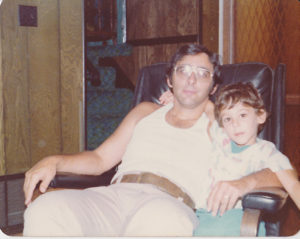 “Yizkor?! I don’t even know her!”
“Yizkor?! I don’t even know her!”
That would have been the title of this blogpost if I had any real courage.
Because there can be no reminiscence of my father of blessed memory without at least one awful pun and, although timely, that is simply awful.
If you were to come to my house (and you are certainly welcome to visit!), and ask either of my daughters for a tissue, I’d bet you dollars to donuts that they would respond, “Tissue?! I don’t even know you!”
And up in heaven, in between an eternal binge-watch of “Law & Order” and “Hardball”, a figure in an Oakland A’s baseball cap and a T-shirt purchased in heaven’s gift shop would smile in recognition.
Although yizkor comes four times a year, for me, this one – at Yom Kippur – always feels like yizkor with a capital “Y”. Maybe it’s because of the solemnity of the day. Likely it’s because of its proximity to his yahrzeit (20 Av). Regardless, this liminal week between Rosh HaShanah and Yom Kippur, in addition to all the other spiritual work required to perform teshuvah, has become an annual exercise to think about my dad, his impact on my life, my own fatherhood, and my work in a field where we are often called upon to be in loco parentis.
To help me do this, I have added the following prayer written by Rebbe Nachman of Breslov from his Likutey Moharan (2:7) to my personal prayerbook:
Dear God,
teach me to embody those ideals
I would want my children
to learn from me.
Let me communicate
with my children – wisely
in ways
that will draw their hearts
to kindness, to deceny
and to true wisdom.
Dear God,
let me pass on to my children
only the good;
let them find in me
the values
and the behavior
I hope to see in them.
There are days when it feels like it happened years ago. There are days when it feels like it never happened. And there are days where it feels like it is happening all over again. I am assured that this is all normal and I am sure that it is. What have I learned over the these last two years of fatherlessness? Well, there is nothing more clarifying than experiencing family pain. There is nothing like watching your parents’ love to remind you to cherish the love you are lucky to have. There is nothing like watching your parents’ vulnerability to encourage you to treasure your children. I continue to pray that as a result of this annual unwelcome reminder of life’s fragility that I will be a better husband, a better father, a better friend, and a better educator.
As part of that process, please allow me apologize to all those I have wronged or hurt, intentionally or unknown over the past year. I look forward to working on myself to be the best “me” I can in the upcoming year.
And I hope to take the lessons of my father of blessed memory to heart as I try to follow his footsteps on the journey of my own fatherhood…
People of the Book (Club)
There’s always a flurry of excitement – particularly in the bibliophilic circles of Jewish education – when the next book that we are supposed to read comes out. I’m as guilty as anyone else. Exhibit A: 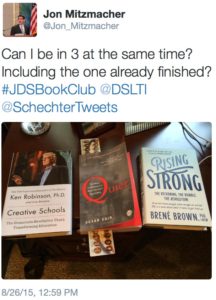
We are usually not content to just be excited about our books, we want a way to demonstrate that excitement and be part of a community equally excited. There are lots of ways that folk do that. Exhibit B: If you glance down to the bottom, righthand corner of this blog, for example, I am happy to share with you my Shelfari so you, too, can know what I am reading and maybe you might find a book you would enjoy as well.
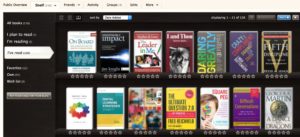 When I go to conferences or other professional development experiences, what notes I do take wind up being lists of books and blogs that I hope to read if I have been inspired by the the learning. I look to my mentors, my colleagues, my social media, and my listservs to see what they are reading so I can read it too.
When I go to conferences or other professional development experiences, what notes I do take wind up being lists of books and blogs that I hope to read if I have been inspired by the the learning. I look to my mentors, my colleagues, my social media, and my listservs to see what they are reading so I can read it too.
If you are reading this blog, the odds are pretty decent you engage in similar behavior and have a stack of books (physical, virtual, or both) awaiting your attention.
But let’s say, through some miracle confluence of work efficiency, family harmony and unicorn dust, that you actually find the time to read that blog, article, journal, or book.
What then?
The question I am interested in exploring is, how do we take what we read professionally and apply it to our practice?
I am confident that what you consider your “practice” changes the question. How a classroom teacher applies his professional reading to practice will be different than how a head of school applies her professional reading to practice. Recognizing the great variability in what people read and their job descriptions, I want to lay out a few ways that people try to get from here to there.
The Book Club
Whether the chardonnay-sipping-the-book-is-simply-an-excuse-to-get-the-gang-together or the annotated-notes-outside-facilitated type, whether in person or virtual, one tried and true way to translate theory to practice is to form, lead or participate in some kind of “book club”. I have (and still am) been in them all. I have required teachers to be in them with formal protocols for participation. I have been in voluntary ones with folk across the wide world. The efficacy of the book club experience is entirely dependent, in my experience, on the expectation of a deliverable.
I think “book clubs” are tremendously motivating for people and have the highest odds of getting people to “read the book”. But then what? Are there expectations for the reading? Are there questions to answer? Applications to work expected?
Collaborative Note-Taking
There are lots of way that folk do this presently. Anything from Evernote to GoogleDocs to TwitterChats (and a million more too many to list) all represent opportunities to share notes about a reading experience with lots and lots of people. What you lose in intimacy might be gained in having a permanent record easily organized. What you lose in motivation might be gained in the forced reflection of putting pen to paper (or more realistically keystroke to screen). Ease of annotation via ebooks makes collaborative note-taking simpler than ever…
…with the caveat that the odds are the only time you have to read is on Shabbat and holidays which render ebooks problematic for many of us.
The Book “Report”
Here, I mean simply that there is an expectation of applied practice which is shared. There are tons of examples to choose from. I have seen schools where teachers are expected to present at faculty meetings about the impact of their professional reading. These presentations can range from the least formal (speed-geeking, think-pair-share, etc.) to super formal (PowerPoint, Prezi, etc.) with lots of room for creativity (mini TED-style talks, hatzatah, etc.) in between. This is the most labor-intensive, but likely forces theory into practice most effectively.
As we collectively finish welcoming the rest of schools back to session in the weeks ahead, as life conspires against our best intentions with regard to professional reading, here’s hoping your stack of books is not simply consumed, but impactful. I look forward to learning with you and from you in the year to come.
First glass of wine is on me.
The Spirituality of “Back to School”
Hopefully your summer has been all you wanted it to be and that whatever your goals were for the summer – professional development, vacation, relaxation, rejuvenation, reconnection, spending time with family, etc. – you accomplished them and more. But as August heads towards September and our earliest schools have already begun to welcome teachers and parents back to school, it seems appropriate to mark the occasion.
In the beginning of one of my favorite books, The Sabbath, by one of my favorite Jewish  thinkers Abraham Joshua Heschel, he says, “Judaism is a religion of time (emphasis in original) aiming at the sanctification of time. Later on, he refers to Shabbat using a similar metaphor – “a palace in time”.
thinkers Abraham Joshua Heschel, he says, “Judaism is a religion of time (emphasis in original) aiming at the sanctification of time. Later on, he refers to Shabbat using a similar metaphor – “a palace in time”.
Among the many things Heschel is describing is the value of celebrating and cherishing moments in time. That time can be sacred and holy. For the purpose of his book, it is the Sabbath under consideration. For the purpose of this blog, it is the idea of how important it is to stop and appreciate the everyday miracles of time all around us.
One of those miracles, to me, is the start of school.
This was a week of firsts for many in our schools, a week of firsts that will be be repeated as schools open their doors across the continent. First days of school for our kindergartners. First days of a last year for our eighth graders or twelfth graders. First days in a new school for teachers and heads (and board members). First days for new families. First echoes of laughter and rolling backpacks in hallways that were still and empty just a few weeks ago. First lessons brought to life from planning and imagination. First hiccups of schools in transition. First successes. First mishaps.
First steps to an unlimited future.
I believe in the religiosity of teaching and the teacher-student relationship. To borrow and butcher Martin Buber, I believe that when we treat others as objects, we are in an “I-It” relationship; when we treat others with recognition of the divine within them – when we acknowledge that we are all created in God’s image and treat each other as such, we are in an “I-Thou” relationship. Taking a deeper step (according to this idea) would be to say that when we treat each other with love, we invite God’s presence into our relationships. Not merely as metaphor, but as an existential fact.
One way to measure school success, I would suggest, will be determined by whether or not  those engaged in the sacred work of schooling see each other as “Thou’s” and not “It’s”. Will we do the work necessary from the start of school to develop “Thou” relationships with our students? With their parents?
those engaged in the sacred work of schooling see each other as “Thou’s” and not “It’s”. Will we do the work necessary from the start of school to develop “Thou” relationships with our students? With their parents?
We’ll know if we are able to identify the good that comes with each student and share it with his or her parents. We’ll know if we are able to share the difficult truths which are our responsibility to share and have them received in the spirit in which we will surely wish it to be received. We’ll know if we are able to hear difficult truths about ourselves in the spirit in which they will surely be given. The spirit of genuine partnership where only the wellbeing of the child is important. The spirit of seeing the best in each other, even when it takes a little more energy.
The spirit that exists when we see each other as a “Thou” and not an “It”.
And so…congratulations to the teachers, heads, staff, lay leaders and volunteers who worked so hard for a successful start. Thank you to all the parents who trust us with your children. Thank you to the students for your smiles and eagerness. And as we move from the excitement of the first week into the routines of the first month, let us all cherish the everyday moments too often overlooked – a new skill mastered, a new friend made, a new year begun.
Ken yehi ratzon (May it be God’s will.)
A Lurker’s Lament: When Did “Sharing” Become “Self-Promotion”?
In my last blog post, I reflected on my personal disconnect between the enthusiasm (over-enthusiasm some might say) I demonstrated in documenting my family’s recent road trip and the challenges I experience in documenting my professional growth. I suggested that as – depending on geography – schools are preparing for the imminent return of teachers and students that it would be useful to try to unpack some of the inhibiting factors that get in the way of a teacher or an administrator (or a lay leader) going through the cycle of “learn, reflect, and share”.

A few people who commented on the post, rightfully pointed out the clumsiness of the analogy. One’s enthusiasm can wax and wane to the degree that one is choosing to do something versus being required. One’s time could be allocated differently to photography versus a written reflection. And I agree with both points. One commentator pointed out something that I hadn’t considered at all and that is the degree to which having an intuitive and easy-to-use structure like pegging photos to a Facebook timeline matters. I think that is spot on. The relationship between process and product may matter and it begs further exploration. Those of you who know more than I – and that’s quite a lot of you – if there are new and exciting platforms that make it easier to document professional growth, inquiring reflective practitioners want to know!
There are other inhibiting factors as well.
I have written and spoken a lot about time as a zero-sum game and hereto it applies. Over the last year I have had the pleasure of visiting lots of schools and engaging with even more and scheduling as an expression of values almost always rises to the top. With no judgment implied, it seems reasonable to me to assume the following:
- Schools struggle to schedule adequate time for professional growth.
- It is difficult to require professional growth – let alone reflection and sharing – without providing adequate time for it to happen.
- Thus, we wind up counting on tapping the finite well of educators’ natural altruism as the primary resource allocated to professional growth.
But none of the above is what I am interested in exploring here. Maybe they are the best remedies for what ails the ecosystem, and I do want to know more about better platforms, better schedules and all the sticks and carrots being used to successfully inculcate a culture of learn, reflect and share within and between schools. This is essentially the work of edJEWcon.
However, as I engage as actively as I can in blogs, groups, chats, etc., I want to identify another barrier that I think can inhibit even the best possible situation – an educator who wants to contribute to the conversation and even has the time, motivation, content and know-how to share…and, yet, still holds back.
I think one of the most inhibiting factors that contributes to lurking and a sense that the same voices dominate the conversation is that we have been conditioned to believe that “sharing” is akin to “self-promotion”.
Let me acknowledge the other side of the argument I want to make just to get it out of the way. People do take advantage of social media, chats, blogs, conversations, etc. as opportunities to self-promote. It happens. Frequently. And it does represent a breach of etiquette and a challenge to the moral imperative of sharing we are trying to create. I have been in those chats and comment sections where it feels more like jockeying for an opportunity to present one’s wares rather than a genuine desire to engage, share and learn from those present. And if I am being honest, knowing how the game is played and that there can be winners, I’ve probably been guilty of it myself. [If you ever find yourself on a chat with me and you feel like playing a drinking game, take a shot every time you hear me say “edJEWcon”. Just be sure you have a designated driver.]
Still.
The concern that whenever we genuinely share can be misconstrued as self-promotion can lead to conversations where only the self-promoters share! Everyone else is too humble to brag except the humblebraggers! [This isn’t to suggest that there aren’t genuine and thoughtful participants; I am exaggerating to make a point.]
I am deeply concerned about helping the thoughtful practitioner convert from lurker to contributor. The ecosystem will only work when feedback loops actively exist and inform. The power of networks is in their ability leverage excellence, facilitate conversation, engage peers in ongoing professional growth and to amplify the learning. That requires more voices more often. That requires the courage to contribute…
I’d rather run the risk of self-promotion if we can raise the volume of sharing. Discerning professionals will weed out the former for the latter. Let the problem of professional growth for Jewish Day Schools be too many dedicated professionals sharing their growth with peers and receiving too much feedback.
Hopefully this humble(brag) blog post will light the spark…
The Documentarian Hypothesis: Why Can’t I Document My Professional Growth With The Same Enthusiasm That I Document My Family Vacation?
I am sitting at the kitchen table at my father-in-law’s beach house in Delaware looking at the ocean upon whose beach my family is presently running, digging, playing and otherwise enjoying a Friday afternoon. We are on the 20th day of an epic road trip that has taken us by minivan from our home in Jacksonville, Florida to Georgia (picking up our eldest daughter from Camp Ramah Darom) up to Washington, DC, continuing to New Jersey (one set of grandparents), New York City (for early-anniversary-without-kids “alone time”), Pennsylvania (another set of grandparents) and a current pitstop in Delaware. We will begin the journey home on Sunday with planned stops in Charleston and Savannah.
By the way, if you want to know what that long in a multigenerational minivan sounds like, feel free to enjoy this playlist while you read:
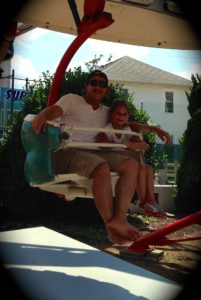 Now if you follow me and/or are “friends” with me on Facebook and/or Instagram, then not only do you already know this…you have (depending on the day) been receiving many updates and photos from the journey.
Now if you follow me and/or are “friends” with me on Facebook and/or Instagram, then not only do you already know this…you have (depending on the day) been receiving many updates and photos from the journey.
[I have blogged in the past that my vision of online authenticity requires a bringing together of my professional and personal identities. Knowing audiences, I tend to keep things more professional on Twitter and Pinterest, more personal on Facebook/Instagram, with the blog almost entirely professional, but with the personal bleeding in when appropriate. It is isn’t perfect (for example I steer away from any political conversations even in my “personal” space), but it seems to be working for me.]
Of course, taking that long of a vacation is impossible, so I have also been working along the way (proving the point that once you demonstrate you can work from anywhere, you wind up having to work from everywhere), holding meetings, fielding calls and sending emails from wifi hotspots all along the East Coast. Somewhere along the way, the constant shifting of mindsets from work to vacation led me to ask the question embedded in this post’s title:
Why Can’t I Document My Professional Growth With The Same Enthusiasm That I Document My Family Vacation?
I would highlight the word “enthusiasm”.
I acknowledge that I am probably the exact demographic Facebook was trying to reach  when they revised their interface to “The Timeline” back in 2012. (By the way, I will always be convinced that this was inspired by Mad Men Episode 13 “The Wheel”.) That innovation completely changed how I use Facebook because I now have a powerful, virtual scrapbook in which I can (and do!) document meaningful events in my life. I am not making news by suggesting that we now live in a world where the urge to document (selfie stick anyone?) has almost superseded the urge to experience. I am acknowledging that I, too, feel that urge. I want to add that picture, that “check in”, that “like” to my timeline almost to make sure that it actually happened. I feel a tug of pressure that doesn’t dissipate until I make that post, at which time I can shift back into the actual experience.
when they revised their interface to “The Timeline” back in 2012. (By the way, I will always be convinced that this was inspired by Mad Men Episode 13 “The Wheel”.) That innovation completely changed how I use Facebook because I now have a powerful, virtual scrapbook in which I can (and do!) document meaningful events in my life. I am not making news by suggesting that we now live in a world where the urge to document (selfie stick anyone?) has almost superseded the urge to experience. I am acknowledging that I, too, feel that urge. I want to add that picture, that “check in”, that “like” to my timeline almost to make sure that it actually happened. I feel a tug of pressure that doesn’t dissipate until I make that post, at which time I can shift back into the actual experience.
I’m not saying it is right or healthy. It simply is.
What occurred me in real time is that I wish I was as enthusiastic and diligent about documenting my professional growth as I am my personal timeline. And, to give myself a little credit, since I do a fair amount of documenting my professional growth and trying to inspire others to do the same, I am equally passionate about figuring out how to get others to be as willing to DOCUMENT and SHARE their learning as they are pictures of their children, recipes for dinner, and where they happen to be at any moment in time.
I am pleased (ecstatic actually) that in the weeks ahead we are going to begin to not only unpack what may be inhibiting the documentation and sharing that has the power to unlock excellence and transform teaching and learning in Jewish Day Schools, but begin providing answers.
Watch (ed) This (JEW) Space (con).
Here’s What I Would Like To Know
I think it is safe to say that just about all school folk are now in summer mode…
That does not mean vacation mode by any stretch of the imagination, but hopefully it does mean a looser schedule, time to reflect, relax and recharge for the work of making next year even better than the year that was.
In that spirit, I would very much like to use this opportunity to have a little fun and,  maybe, get a chance to get some questions answered.
maybe, get a chance to get some questions answered.
Introducing in absolutely no order whatsoever…
Here’s What I Would Like To Know
- What is your summer reading list?
- What is the most important thing you learned this year?
- If you could show just one video that demonstrated what you believe to be true about teaching and learning, what would it be? (Send link please!)
- How has social media impacted your professional growth?
- Whose blogs are you reading? Who do you follow on Twitter? Why?
- What doesn’t exist that if it did would transform your work?
- In your professional/volunteer life, what keeps you up at night?
- How do you manage to stay healthy?
- How much time do you spend with your family?
- Who are your mentors and can I borrow them?
- Do contests inspire you? Are you competitive?
- What do you think about this?
- What advice would you give a new head of school?
- What advice would you give a new board chair?
- What’s your professional bible?
- Can kids graduate a K-8 and be fluent in Hebrew?
- What does a healthy relationship between a school and a synagogue feel like?
- How big a gap exists between your current school and your idealized school and is money the only thing minding the gap?
- Does it matter what I think about current events and am I supposed to be blogging about it?
- What do you think about uniforms?
- How do you balance work and family?
- What is the most creative thing you did this year?
- What topics would you like to see me blog about in the year ahead?
I look forward to your answers and would be thrilled to answer any questions you might have for me, for Schechter or for the field.
May the beginning of your summer bring you all the well-deseved joy you deserve…
Airplane Mode – My Year in Professional Reading
I have spent more time in airports, airplanes, rental cars and hotels this year than I could ever have imagined. It is critical to my job to be a physical presence at our schools and in our communities, especially in my first year. But in addition to all the obvious benefits travel has produced for me professionally, it has also yielded one unintended, yet important benefit…
…time to read!
Yes, I am aware that I could easily pay for wifi on my flights in order to stay connected at all times and there have been times I’ve had to fight the temptation to remain on the grid. But putting my phone into “airplane mode” has been to my professional growth like putting my soul into “Shabbat mode” continues to be to my spiritual growth. Once that cabin door is secured, I take a deep breath, go into airplane mode, and open my book. And, yes, an actual book. I know I am supposed to always model excellence in 21st century learning, so I guess I should do all my professional reading via iPad, but for whatever reason, when it comes to doing professional development 30,000 miles up, I prefer a book in my hand.
Don’t tell anyone.
All the books I read this year were suggested from colleagues and friends from all the usual places…and I didn’t even get to half of what I wanted to read. Luckily, that’s partly why they made summer! If any of the books below inspired your professional growth, do comment or otherwise make it known. And if you have new suggestions…always happy to add one more to the seat pocket in front of me…
If you missed our Summer Professional Development publication, please check it out here.
To the schools that have already closed, I hope you are already enjoying your summer…
…and to those closing soon, I hope you close with great pride on a year well spent.
I, too, look forward to some recharging and relaxing (just a bit!) this summer and, so, this blog will likely come less frequently until school returns in August. I have one more post for sure on next year’s programmatic agenda and any updates on the future worth sharing and, then I will enjoy what it is like to blog when the spirit – not a deadline – moves me.
Flip-flops…here we come…
The Jewish Education Olde Thyme Radio Hour: “Conversations We Aren’t Having” w/Jonathan Cannon
Believe it or not, but our earliest schools are wrapping up this week and the rest will be doing the same in the weeks to come. We, too, will be transitioning into summer modes of communication. Last week, I shared the results of our first-ever Annual Membership Survey. And in the weeks to come, we will lay out more detail about our programmatic agenda for next year and how feedback may have played into our decision-making process.
In the meanwhile, let me express my sincere thanks to the good folks at ELI Talks and ELI on Air for letting me and my good friend Rabbi Marc Baker experiment with a podcast pilot this year. I have said before that just the time we spent prepping for the podcasts and conducting them was more than sufficient for me to deem the experiment a success. But we do have ambition larger than finding an excuse to think together…
Our goals for the podcast’s future include…
- Being more interactive – our goal is for the podcast to feel more like a “talk show” and less like…um…a “podcast”. This means we need to be more aggressive/inspirational/inviting/encouraging in order to weave people’s questions, comments and contributions into the podcast itself. We know (hope) you are out there listening…now we need you to be part of the action.
- Relevance. Strong topics and strong guests. We want to bring you ideas and people you really want to talk to and hear from.
- Edutainment. We want this to be fun – for us and for you! Finding a way to balance serious conversation with having a good time is what it is all about.
Have we gotten any better at the above? Check out our most recent podcast and let us know! Feel free to comment here on my blog or on the podcast page itself!



